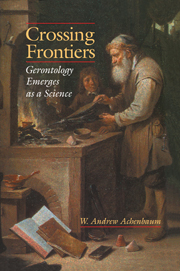Part I - Old age becomes a “problem” worth investigating scientifically
Published online by Cambridge University Press: 26 March 2010
Summary
In 1874 GEORGE M. BEARD, M.D. read a paper before the Medico-Legal Society of New York on “Legal Responsibility in Old Age, Based on Researches into the Relation of Age to Work.” “It would be easy to ascertain the law of the relation of age to work by the mere expression of an opinion,” he noted, “and thousands of opinions have been expressed upon it.” It would be “comparatively easy” to determine whether gifted people did their best work at younger or older ages, Beard elaborated, “but partial statistics, prepared to form a theory, can never settle these questions – cannot satisfy the inquirer, nor relieve the doubter; nor have any convincing power whatever.” Beard had great faith in Science, but he knew that appropriate methods were not yet available to illuminate processes of human aging:
If physiology alone could solve these problems – if it were possible for the microscope to so reveal the complex mechanism of the brain, and if chemistry could so analyze its intricate and manifold constituents as to make it a human possibility to determine, from the brain itself, both the general and special functions of which it is capable, and the modifications which these functions undergo by age, by disease, and external conditions – then, by a sufficient number of post-mortem examinations, these hard questions could be scientifically answered; but, unfortunately for these methods of investigation, physiology and pathology are just born, and neither our children nor our children's children can expect to see them exact and complete sciences.
- Type
- Chapter
- Information
- Crossing FrontiersGerontology Emerges as a Science, pp. 21 - 22Publisher: Cambridge University PressPrint publication year: 1995

